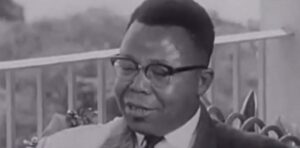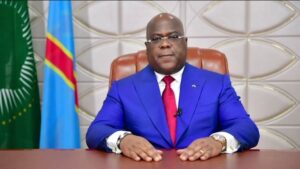The Democratic Republic of Congo (DR Congo) has a rich and tumultuous history marked by various leaders who have shaped the nation’s path.
Since gaining independence in 1960, DR Congo has seen a series of presidents, each leaving a distinct imprint on the country. Let’s explore the list of Congolese presidents, their years in office, and key highlights of their leadership.
READ ALSO: Presidents That Have Ruled Ethiopia Till Date
List of Presidents of DR Congo
| President | Years in Office |
|---|---|
| Joseph Kasa-Vubu | 1960 - 1965 |
| Mobutu Sese Seko | 1965 - 1997 |
| Laurent-Désiré Kabila | 1997 - 2001 |
| Joseph Kabila | 2001 - 2019 |
| Félix Tshisekedi | 2019 - Present |
The First President of DR Congo:

Tenure: 1960 – 1965
Joseph Kasa-Vubu was the first president of DR Congo after it gained independence from Belgium on June 30, 1960. His presidency was marked by significant challenges as the new nation navigated its early years.
Notable Achievements
- Independence Leader: Kasa-Vubu played a crucial role in leading DR Congo to independence and was a prominent figure in the nationalist movement.
- National Unity Efforts: He worked to promote national unity in a country with diverse ethnic groups and significant regional differences.
Downsides
- Political Instability: His tenure was marked by political instability, including conflicts with Prime Minister Patrice Lumumba and other political factions.
- Coup and Overthrow: Kasa-Vubu’s presidency ended when he was overthrown in a coup led by Joseph-Désiré Mobutu (later Mobutu Sese Seko) in 1965.
The Current President of DR Congo:

Tenure: 2019 – Present
Félix Tshisekedi, the current president, took office in January 2019. He is the son of the late opposition leader Étienne Tshisekedi and has been a significant political figure in recent Congolese history.
Notable Achievements
- Peaceful Transition: Tshisekedi’s election marked the first peaceful transfer of power in DR Congo’s history, a significant milestone for the country.
- Anti-Corruption Efforts: He has pledged to tackle corruption, improve governance, and promote economic development.
- Healthcare Initiatives: His administration has made strides in improving healthcare, particularly in combating the Ebola outbreak in the eastern part of the country.
Downsides
- Political Tensions: Tshisekedi’s tenure has seen political tensions, particularly with his coalition partners and the lingering influence of former President Joseph Kabila.
- Security Challenges: The country continues to face significant security challenges, especially in the eastern regions, with ongoing conflicts and humanitarian crises.
READ ALSO: Presidents That Have Ruled Uganda Till Date
Current Prime Minister: Jean-Michel Sama Lukonde (as of 2021)
Notable Achievements
- Economic Reforms: Sama Lukonde has focused on economic reforms aimed at improving the business environment and attracting foreign investment.
- Infrastructure Development: His tenure has seen efforts to enhance infrastructure, including roads and energy projects, to support economic growth.
Downsides
- Economic Challenges: Despite efforts, the country continues to face significant economic challenges, including poverty and unemployment.
- Security Issues: The ongoing security issues in the eastern regions remain a significant challenge for the government.
READ ALSO: Presidents That Have Ruled Senegal Till Date
Other Notable Presidents
Mobutu Sese Seko
Tenure: 1965 – 1997
Mobutu Sese Seko ruled DR Congo (then Zaire) for over three decades after seizing power in a coup. His reign is one of the most notable in the country’s history.
Achievements
- Centralized Power: Mobutu centralized power and sought to unify the nation under his rule.
- Cultural Revival: He promoted a cultural revival through the policy of “Authenticité,” encouraging a return to traditional Congolese values and customs.
Downsides
- Authoritarian Rule: Mobutu’s regime was highly authoritarian, marked by repression, human rights abuses, and suppression of political opposition.
- Corruption: His rule was infamous for rampant corruption and kleptocracy, leading to significant economic decline and mismanagement.
Laurent-Désiré Kabila
Tenure: 1997 – 2001
Laurent-Désiré Kabila came to power after overthrowing Mobutu Sese Seko in 1997. His presidency was marked by attempts to rebuild the nation.
Achievements
- Overthrew Mobutu: Kabila’s rise ended Mobutu’s long and corrupt rule, bringing hope for change and reform.
- Economic Reforms: He initiated efforts to reform the economy and rebuild the nation’s infrastructure.
Downsides
- Continued Conflict: His tenure saw continued conflict and instability, particularly with the eruption of the Second Congo War.
- Assassination: Kabila’s presidency ended abruptly when he was assassinated in 2001, leading to further uncertainty and turmoil.
READ ALSO: Presidents That Have Ruled Libya
Joseph Kabila
Tenure: 2001 – 2019
Joseph Kabila, the son of Laurent-Désiré Kabila, took over the presidency after his father’s assassination. He served for nearly two decades.
Achievements
- Peace Agreements: Joseph Kabila oversaw several peace agreements aimed at ending the conflict and stabilizing the country.
- Economic Growth: His tenure saw periods of economic growth and infrastructure development, particularly in the mining sector.
Downsides
- Political Repression: His presidency was marked by political repression, with crackdowns on opposition and limited political freedoms.
- Controversial Elections: His tenure ended with controversial elections, raising concerns about democratic processes and governance.
READ ALSO: Presidents That Have Ruled Algeria
Conclusion
The Democratic Republic of Congo’s presidential history is a testament to its resilience and complexity. Each president has contributed uniquely to the nation’s journey, with achievements and challenges that have shaped its path. As DR Congo continues to evolve, the lessons from its past leaders will play a crucial role in informing its future.
